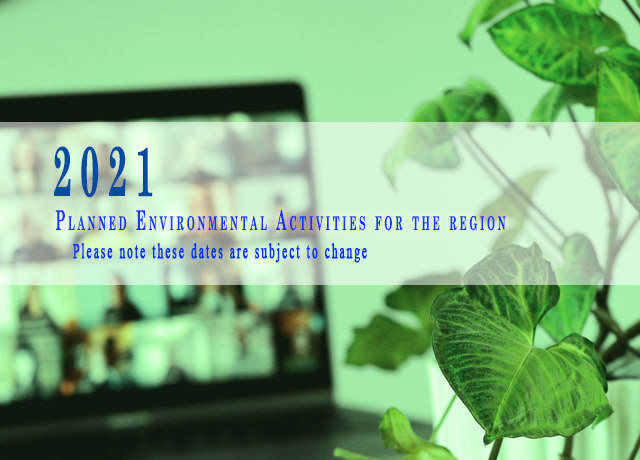The ICAO ESAF Regional Office, under the guidance of the ICAO Headquarters, provides support on aviation environmental protection to the 24 States under its umbrella. This is to improve the environmental performance of aviation in the Region. The ESAF Region's environmental priorities range from support with information on Sustainable Aviation Fuels (SAFs), Carbon Offsetting and Reduction Scheme for International Aviation (CORSIA) implementation; development of State Action Plans and assistance with the establishment of Buddy Partnerships on State Action Plans, CORSIA and SAFs. All this is done with the aim of achieving the three major environmental goals:
-
to limit or reduce the number of people affected by significant
aircraft noise;
-
to limit or reduce the impact of aviation emissions on
local air quality; and
-
to limit or reduce the impact of aviation
greenhouse gas emissions on the global climate.
The
Committee on Aviation Environmental Protection (CAEP ) supports the ICAO Council in formulating new policies and adopting new Standards and Recommended Practices (SARPs) related to noise, local air quality (LAQ) and the basket of measures for reducing international aviation CO2 emissions, including aircraft technology, operational improvement, sustainable aviation fuels and market-based measures (CORSIA).
Information related to CAEP Members, structure, terms of reference and meetings can be found here.
>> Click to view
CAEP Members (States only) |
CAEP Members are
experts nominated by their States to participate in and contribute substantially to the committee's work.
CAEP Members have the right to vote, move or second motions or amendments in discussions of the committee. |
CAEP Observers (States and Organisations)
|
CAEP Observers are experts nominated by States, international non-governmental organizations, United Nations bodies and regional State organizations to bring their specific views that would not otherwise be available to the work of CAEP.
CAEP Observers have the right to take part in discussions of the CAEP but without the right to vote, move or second motions or amendments.
The maximum number of CAEP Observers from international nongovernmental organizations is ten. |
To improve the balance of geographical representation, additional CAEP seats should be filled by States of under-represented regions.
How to become a CAEP Member/Observer
The State's Director General (DG) makes a request to ICAO to be a Member/Observer in CAEP with an expert for consideration including:
-
The prospective Member/Observer's CV;
-
Cover letter that highlights the areas of interest and the expertise that will be provided to CAEP and its Sub-groups;
-
The letter should include a statement of commitment to work for at least a full CAEP cycle;
-
Expenses are incurred by the Nominator.
The ICAO Council will consider the nomination against the following selection criteria:
- They are able to provide ready access to research facilities and supporting expertise;
- Their level of technical development and resources for implementation are representative of the world average; and
- They represent the main geographical areas of the world.
States interested in applying for CAEP membership should contact
caep@icao.int for more information.
What happens to the work done by CAEP?
The CAEP submits reports of its formal meetings to the Council which in turn refers such reports to the Air Navigation Commission for a preliminary review and may, at its discretion, also refer such reports to the Air Transport Committee for a preliminary review of relevant portions of the report.
The Air Navigation Commission and/or the Air Transport Committee will present reports on their respective preliminary reviews to the Council for its consideration. The Council reviews and adopts the recommendations from CAEP, including amendments to the SARPs, and sequentially reports to the ICAO Assembly. The Assembly revises and updates the ICAO policies and practices pertaining to environmental protection. Assembly Resolutions
A40-17,
A40-18 and
A40-19 provide the most recent policies and practices.
Important Environmental Tools (E-Tools)
Information on the following environmental tools developed and maintained by ICAO can be found
here These are all available to States and the general public.
- ICAO Carbon Emissions Calculator;
- ICAO Green Meetings Calculator;
- ICAO Fuel Savings Estimation Tool;
- Environmental Benefits Tool (EBT);
- Marginal Abatement Cost (MAC) Curve Tool;
- ICAO E-learning Course on State Action Plans;
- Eco-Airport Toolkit E-collection; and
- ICAO CORSIA CO2 Estimation and Reporting Tool (CERT).

|
Title
|
Language
|
Planned date(s)
|
Venue
|
ESAF / WACAF Regional Workshop on the 14 CORSIA Implementation Documents
|
Eng / Fre
|
30-31 March 2021
|
Online
|
ESAF/WACAF ACT CORSIA Webinar
|
Eng / Fre
| 06 April 2021
| Online
|
ESAF/WACAF SAP Capacity Building Webinar (Group 1)
| Eng / Fre
|
End of April 2021
| Online
|
1st SAP 10 Competition Committee Meeting
|
Eng / Fre
| April 2021 (TBC)
| Online
|
ESAF/WACAF SAP Capacity Builiding Webinar (Group 2)
| Eng / Fre
| May 2021 (TBC)
| Online
|
ACT CORSIA Phase 3
| Eng / Fre
|
01 June 2021
| Online
|
ESAF/WACAF CORSIA Webinar
| Eng / Fre
| 01 July 2021
| Online
|
ESAF/WACAF ENV Webinar (CORSIA & SAPs)
| Eng / Fre
| 01 October 2021
| Online
|
ESAF/WACAF SAP 10 Competition Event
| Eng / Fre
| 08 October 2021
| Online
|
Submission of applications to the TAB for assessment of emissions unit programmes
